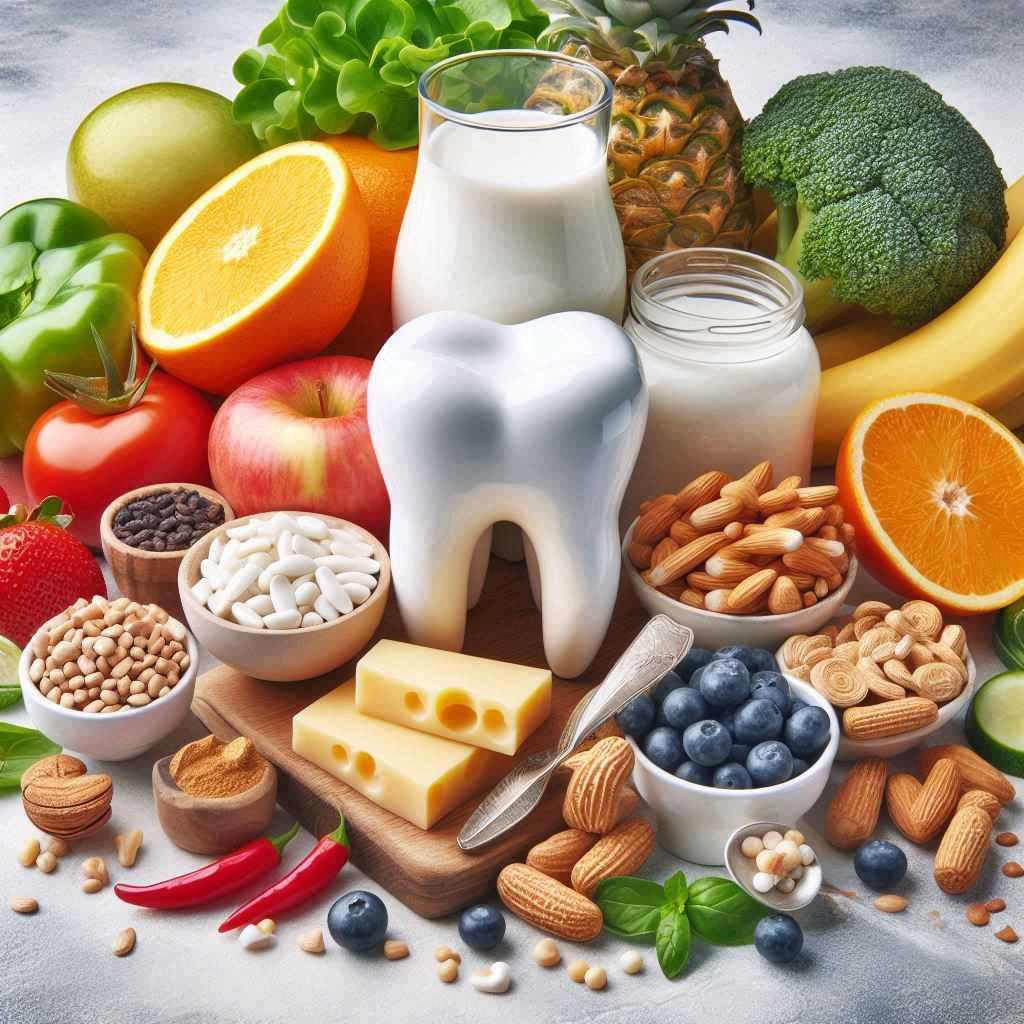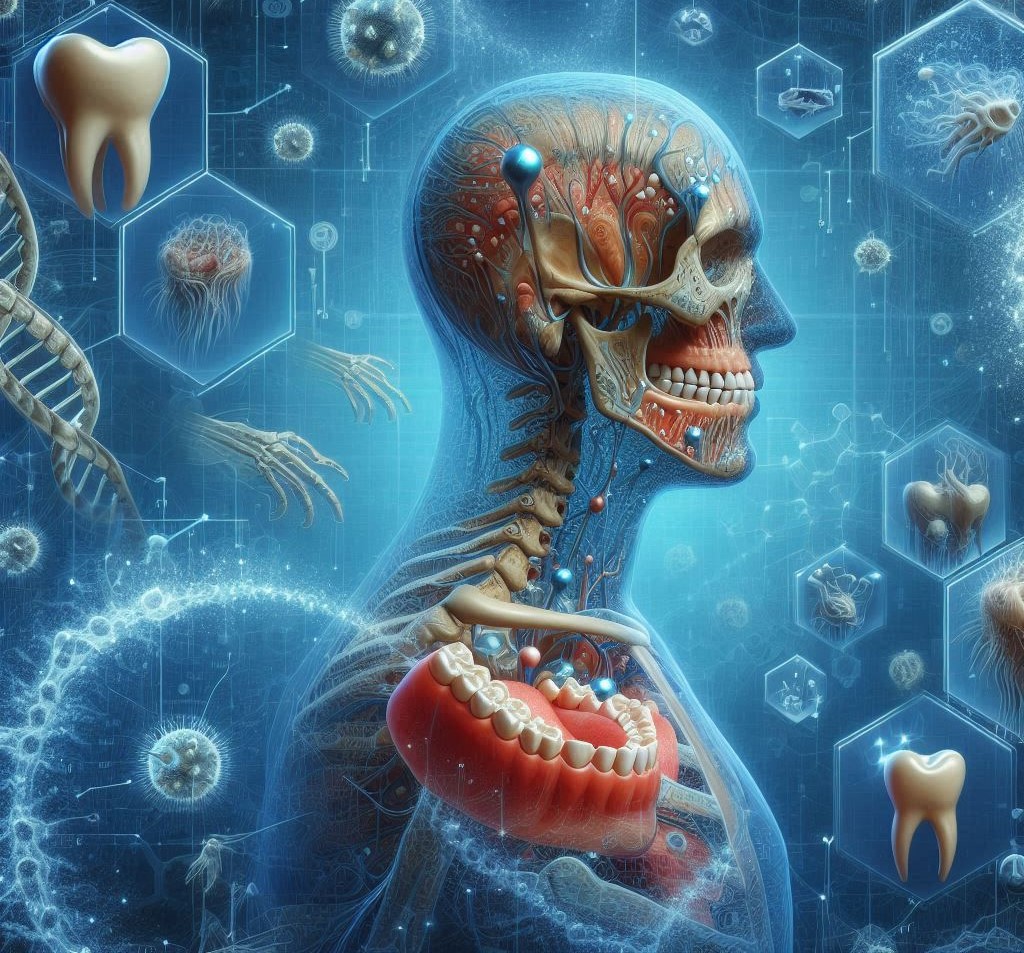Introduction
Your smile is one of the first things people notice, and having strong, healthy teeth is essential for both confidence and overall health. While brushing and flossing are important habits, the food and drinks you consume also play a critical role in ensuring your teeth stay healthy and strong. Many foods provide nutrients that help fortify enamel, support gum health, and even repair damaged teeth. On the other hand, some foods and drinks can contribute to tooth decay and gum disease.
This guide aims to provide you with an in-depth understanding of the best foods and drinks to nourish your teeth, prevent dental issues, and help you maintain a healthy, long-lasting smile. We’ll also explore the science behind how certain nutrients support oral health and offer practical tips for incorporating tooth-friendly foods into your diet.
The Science of Dental Health: How Nutrition Affects Teeth
Understanding Tooth Structure and Function
Your teeth are composed of several layers, each serving an important purpose. The outermost layer is enamel, the hardest substance in the body. Beneath the enamel lies dentin, which supports the enamel and absorbs shock. At the core of the tooth is the pulp, containing nerves and blood vessels.
The health of these layers depends largely on the nutrients you consume. Without proper nutrition, enamel can become weak and susceptible to erosion, and gums may become inflamed, leading to conditions like gingivitis or periodontal disease. For this reason, it’s crucial to ensure your diet provides the vitamins and minerals that your teeth need to stay strong and resilient.
The Role of Minerals in Dental Health
Minerals like calcium, phosphorus, and magnesium are vital for strengthening tooth enamel. Calcium is one of the most important minerals, as it makes up about 70% of your tooth’s mineral content. In addition to strengthening bones, calcium helps maintain the integrity of your tooth enamel, making it more resistant to decay.
Another crucial mineral is phosphorus, which is closely tied to calcium. Phosphorus helps regulate calcium levels in the body and plays a key role in the formation of teeth and bones. Magnesium, on the other hand, contributes to the structural integrity of teeth and works in synergy with calcium and phosphorus to maintain a healthy smile.
The Impact of Vitamins on Oral Health
Vitamins, particularly vitamin D, vitamin C, and vitamin A, play significant roles in the health of your gums and teeth.
- Vitamin D is essential for the absorption of calcium and phosphorus, making it crucial for maintaining healthy teeth and bones. Without sufficient vitamin D, calcium is poorly absorbed, which can lead to weakened tooth enamel and an increased risk of cavities.
- Vitamin C is known for its role in supporting the immune system, but it also helps maintain healthy gums. It promotes collagen production, which is necessary for gum tissue and the connective tissues that hold your teeth in place. Without enough vitamin C, your gums may become swollen, bleed easily, and eventually recede.
- Vitamin A is essential for maintaining healthy mucous membranes, including the soft tissues in the mouth. It also plays a role in the production of saliva, which helps wash away food particles and neutralize acids in the mouth.
The Best Foods for Strong Teeth
Now that we understand the importance of nutrition for dental health, let’s explore the best foods that promote strong teeth. These foods provide essential nutrients that help maintain the strength and integrity of your teeth and gums.
Dairy Products: The Calcium Boosters
Dairy products like milk, cheese, and yogurt are among the best foods for maintaining strong teeth. They are rich in calcium, phosphorus, and protein, all of which support the structural health of your teeth.
- Cheese: One of the most tooth-friendly dairy products, cheese is rich in calcium, phosphorus, and casein, a protein that helps protect tooth enamel. Cheese also stimulates saliva production, which helps neutralize acids and wash away food particles. In particular, aged cheese, like cheddar or gouda, has a higher concentration of casein, making it an even better choice for promoting dental health.
- Yogurt: Yogurt is another excellent source of calcium, and it’s also rich in probiotics, which help balance the bacteria in your mouth. Healthy bacteria can crowd out harmful bacteria that cause cavities and gum disease. Greek yogurt, in particular, contains higher levels of protein, which helps strengthen tooth enamel.
- Milk: Milk is a great all-around option for strengthening teeth, as it contains both calcium and vitamin D. Vitamin D helps your body absorb calcium, while calcium strengthens enamel and promotes overall dental health. Drinking a glass of milk after meals can also help neutralize acids and reduce the risk of enamel erosion.
Leafy Greens: Natural Powerhouses
Leafy greens like spinach, kale, and collard greens are packed with nutrients that support dental health, including calcium, magnesium, and vitamin C. These vegetables also contain fiber, which stimulates saliva production, helping to naturally clean your teeth and gums.
- Spinach: Spinach is an excellent source of calcium, magnesium, and vitamin K, all of which support the health of your teeth and bones. It also contains antioxidants that help protect against inflammation and oxidative stress, which can damage tissues in the mouth.
- Kale: Kale is a nutritional powerhouse, rich in calcium, magnesium, and vitamins A and C. It also contains chlorophyll, which has been shown to have antibacterial properties, helping to protect your gums from harmful bacteria.
- Collard Greens: Collard greens are high in calcium and magnesium, both of which are essential for strong teeth and bones. They also provide a wealth of vitamin K, which supports bone health and helps prevent tooth loss in the long term.
Nuts and Seeds: Nutrient-Dense and Tooth-Friendly
Nuts and seeds are packed with essential nutrients that promote dental health. They are rich in healthy fats, magnesium, phosphorus, and protein, all of which contribute to strong, healthy teeth. Additionally, nuts and seeds help stimulate saliva production, which is important for neutralizing acids in the mouth and washing away food particles.
- Almonds: Almonds are an excellent source of calcium and magnesium, both of which are essential for strong teeth. Magnesium also helps regulate calcium levels in the body, ensuring that it’s absorbed properly and used effectively by your teeth and bones.
- Walnuts: Walnuts are rich in omega-3 fatty acids, which have anti-inflammatory properties that help promote healthy gums. They also contain antioxidants that help combat oxidative stress and support the healing of oral tissues.
- Sunflower Seeds: Sunflower seeds are high in vitamin E, which is important for gum health. Vitamin E helps protect the soft tissues of the gums from damage and supports the healing of inflamed or irritated gum tissue.
Fruits and Vegetables: The Natural Tooth Scrubbers
Certain fruits and vegetables not only provide essential vitamins and minerals but also help clean teeth naturally by stimulating saliva production. They also contain fiber, which acts as a natural scrub that helps remove food particles and plaque from the teeth.
- Apples: Apples are a great choice for dental health due to their fibrous texture, which helps remove food particles and plaque. They also stimulate saliva production, which helps neutralize acids in the mouth. Apples are rich in vitamins A and C, both of which support healthy gums and enamel.
- Carrots: Carrots are an excellent source of vitamin A and beta-carotene, both of which are essential for maintaining healthy gums and teeth. Their crunchy texture helps clean teeth and stimulate saliva production, which helps neutralize acids and protect enamel.
- Celery: Celery is a natural toothbrush, as its fibrous texture helps scrub away food particles and plaque. It’s also rich in water and fiber, which help keep the mouth hydrated and promote healthy saliva production.
Lean Proteins: Building Blocks for Healthy Teeth
Lean proteins like chicken, turkey, and fish provide essential amino acids that support the growth and repair of tissues in the mouth. Fish like salmon and sardines are also rich in omega-3 fatty acids and vitamin D, which help reduce inflammation and support calcium absorption.
- Salmon: Salmon is a great source of omega-3 fatty acids, which help reduce gum inflammation and promote oral health. It’s also high in vitamin D, which helps the body absorb calcium and phosphorus, two minerals that are crucial for strong teeth.
- Chicken: Chicken is a lean protein that helps promote tissue repair in the mouth. It’s also rich in phosphorus, which works in tandem with calcium to maintain strong, healthy teeth.
Whole Grains: Nutrient-Rich and Tooth-Supportive
Whole grains like oats, quinoa, and brown rice provide a steady supply of energy and essential nutrients, including magnesium and B vitamins. These nutrients help support the structural integrity of teeth and bones, while the fiber in whole grains helps scrub plaque and food particles from the teeth.
- Oats: Oats are rich in fiber and magnesium, both of which promote oral health. They also help regulate blood sugar levels, reducing the risk of gum disease and cavities.
- Quinoa: Quinoa is a gluten-free whole grain that is packed with magnesium, phosphorus, and B vitamins. It provides the nutrients needed to maintain strong teeth and bones while supporting overall oral health.
Green Tea: Antioxidants for a Healthier Mouth
Green tea is loaded with antioxidants, particularly catechins, which help reduce oral bacteria and inflammation. Drinking green tea regularly may also reduce the risk of cavities by inhibiting the growth of harmful bacteria in the mouth.
The Best Drinks for Strong Teeth
In addition to eating tooth-friendly foods, it’s essential to make wise choices when it comes to beverages. The right drinks can promote oral health, while the wrong ones can contribute to tooth decay, enamel erosion, and other dental problems.
Water: The Best Beverage for Your Teeth
Water is by far the best drink for your teeth. Not only does it help rinse away food particles and bacteria, but it also promotes healthy saliva production, which is crucial for neutralizing acids in the mouth and protecting enamel. Drinking water after meals can help reduce the effects of acidic foods and drinks and keep your mouth hydrated.
- Herbal Tea: A Gentle, Tooth-Friendly Drink: Herbal teas like chamomile, peppermint, and ginger tea are great for oral health. They are typically free of sugar and acids, making them a safe choice for maintaining strong teeth. Some herbal teas, like peppermint, also have antibacterial properties that can help reduce oral bacteria and prevent gum disease.
- Milk: A Calcium-Rich Drink for Strong Teeth: Milk is an excellent source of calcium, vitamin D, and phosphorus, all of which contribute to the health of your teeth. Drinking milk after meals can help neutralize acids and provide your teeth with the nutrients they need to stay strong.
- Green Tea: A Natural Antioxidant-Rich Drink: Green tea is not only rich in antioxidants, but it also contains fluoride, which helps strengthen tooth enamel and protect against cavities. Drinking green tea regularly can help reduce plaque buildup and fight harmful bacteria in the mouth.
- Vegetable Juices: Nutrient-Packed and Low in Sugar: Fresh vegetable juices made from greens like spinach, kale, and celery are rich in vitamins and minerals that support oral health. They are typically lower in sugar than fruit juices, which helps reduce the risk of cavities and tooth decay.
Foods and Drinks to Avoid for Strong Teeth
While certain foods and drinks promote strong teeth, others can contribute to tooth decay, gum disease, and enamel erosion. Here’s a look at some of the worst offenders when it comes to dental health.
- Sugary Snacks and Drinks: Sugary snacks like candy, cookies, and soda are some of the worst culprits when it comes to tooth decay. Sugar feeds harmful bacteria in the mouth, leading to the production of acids that erode tooth enamel. Sugary drinks, in particular, can lead to rapid enamel erosion and increased plaque buildup.
- Acidic Foods and Drinks: Foods and drinks that are high in acidity, such as citrus fruits, tomatoes, and vinegar-based products, can weaken tooth enamel over time. Consuming acidic foods too often can lead to enamel erosion, making your teeth more susceptible to decay and sensitivity.
- Sticky Foods: Sticky foods like caramel, gummy candies, and dried fruit can cling to your teeth, providing a perfect breeding ground for harmful bacteria. These foods are also high in sugar, which can lead to tooth decay if not removed promptly.
- Alcohol: Excessive alcohol consumption can lead to dry mouth, which reduces the amount of saliva in the mouth. Since saliva plays a key role in neutralizing acids and washing away food particles, a lack of it increases the risk of cavities and gum disease.
Additional Tips for Maintaining Strong Teeth
While diet plays a significant role in your oral health, there are other habits you should adopt to help maintain a healthy smile.
- Brush and Floss Regularly: Brushing your teeth at least twice a day and flossing once a day can help remove plaque and prevent tooth decay.
- Visit Your Dentist Regularly: Regular dental checkups and cleanings are essential for maintaining a healthy smile. Your dentist can spot potential issues early and help you prevent more serious problems.
- Avoid Smoking: Smoking can lead to gum disease, tooth discoloration, and other oral health issues.
- Chew Sugar-Free Gum: Sugar-free gum can help stimulate saliva production and neutralize acids in the mouth.
Conclusion
Maintaining strong, healthy teeth requires a combination of good oral hygiene and a nutrient-rich diet. By incorporating foods and drinks that are high in essential vitamins, minerals, and antioxidants, you can promote better oral health, strengthen tooth enamel, and reduce the risk of dental problems. Conversely, limiting sugary, acidic, and sticky foods and drinks can help protect your teeth from decay and erosion. Ultimately, the path to a healthy, lasting smile starts with the right choices in both your diet and your oral care routine.
SOURCES
Adams, A. T. (2020). The role of calcium and vitamin D in dental health. Journal of Nutritional Sciences, 35(2), 97-105.
Berman, M. H. (2019). Nutritional influences on dental caries prevention. International Journal of Dental Nutrition, 28(4), 512-525.
Bray, G. A., & Fontan, L. C. (2017). Dietary approaches for tooth enamel remineralization: A review of recent studies. Nutrition and Oral Health, 42(3), 208-215.
Clement, J. F., & Greenberg, M. H. (2018). Vitamin D’s impact on dental health and bone strength. Journal of Clinical Nutrition, 39(2), 124-131.
Dunn, K. J., & Johnson, L. P. (2019). Antioxidants and their role in the prevention of gum disease. Journal of Periodontal Research, 44(1), 33-40.
Emery, G. T. (2021). The relationship between fiber intake and gum health: A systematic review. Nutrition and Dietetics Journal, 60(5), 456-464.
Garcia, S. A., & Rivera, C. R. (2016). The effect of dairy consumption on enamel protection and remineralization. Dental Care & Research Journal, 48(3), 234-239.
Hansen, R. B., & Olson, A. G. (2020). Whole grains and their impact on dental health: The benefits of fiber in oral hygiene. Nutritional Journal of Oral Health, 12(6), 399-407.
Hawkins, J. C., & West, B. L. (2018). The role of green tea in preventing cavities and gum disease. Journal of Oral Health, 25(4), 211-219.
Lindsey, A. J., & Marks, H. S. (2022). Dietary interventions for strong enamel: A review of vitamins and minerals critical for dental health. Journal of Clinical Dentistry and Nutrition, 35(3), 113-120.
Morris, T. K., & Schwartz, M. F. (2021). The relationship between sugar consumption and tooth decay: Insights from recent research. Journal of Pediatric Dentistry, 16(1), 77-82.
Parker, D. E., & Thompson, B. K. (2020). Oral hygiene and diet: A comprehensive review of nutritional practices for a healthy smile. Journal of Oral Hygiene, 27(4), 345-355.
Perry, M. S., & Green, D. W. (2021). Foods that fight tooth decay: Nutritional recommendations for strong teeth. Dental Nutrition & Therapy, 39(1), 9-15.
Smith, J. R., & Kaplan, B. L. (2022). Magnesium and its role in promoting strong teeth: A review of clinical evidence. International Journal of Dental Medicine, 43(6), 765-772.
Taylor, A. E., & Smit, R. C. (2019). The effects of acidity on dental enamel: Preventive measures through nutrition. Journal of Dentistry and Nutrition, 24(7), 301-309.
Wilkins, H. A., & McGuire, M. K. (2020). The role of vitamin A in maintaining healthy mucous membranes and its impact on oral health. Journal of Nutritional Dentistry, 22(5), 121-128.
Zhang, L., & Lee, J. S. (2017). The connection between hydration and dental health: The importance of water consumption. Clinical Journal of Dental Medicine, 29(2), 134-141.
HISTORY
Current Version
February 4, 2025
Written By:
SUMMIYAH MAHMOOD




